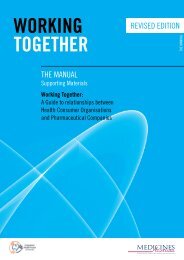Transition in Chronic Illness - Understanding Transition
Transition in Chronic Illness - Understanding Transition
Transition in Chronic Illness - Understanding Transition
- No tags were found...
You also want an ePaper? Increase the reach of your titles
YUMPU automatically turns print PDFs into web optimized ePapers that Google loves.
Help<strong>in</strong>g Others By Facilitat<strong>in</strong>g <strong>Transition</strong>Given our po<strong>in</strong>t of view that illness is a part of life, our <strong>in</strong>tention is to seek and facilitateunderstand<strong>in</strong>g and tolerance for people liv<strong>in</strong>g with illness and to connect with others. We canshare the process we have engaged with that enabled our transition experiences to unfold.Connect<strong>in</strong>g with others is important. It is through conversations with others,either <strong>in</strong> person or on-l<strong>in</strong>e that we have come to realise that we have commonexperiences even though our conditions are vastly different. Our experiencesare affirmed by listen<strong>in</strong>g to the stories of others.It seems a positive ga<strong>in</strong>ed from the illness experience may be the connectionsmade with others that I may not have otherwise met. I have met so manyvaluable friends because of my changes <strong>in</strong> health and lifestyle that resultedfrom these changes. It is amaz<strong>in</strong>g how as our lives change and how if we don’tfight it we change too, it is a case of go<strong>in</strong>g with the flow.JudythThe support and k<strong>in</strong>dness from this group and the knowledge that we all havesimilar symptoms despite different illnesses kept me go<strong>in</strong>g when I jo<strong>in</strong>ed justover a year ago. I was feel<strong>in</strong>g extremely ill at the time and felt anxious aboutit all, and grappl<strong>in</strong>g with how to deal with it and who to tell about it, and howto tell them. A forum helps us develop the confidence to know we are right,that we really do feel ill that it is not imag<strong>in</strong>ation or exaggeration, it is real andtherefore resilience spr<strong>in</strong>gs from this understand<strong>in</strong>g of ourselves.DiWhen help<strong>in</strong>g people with chronic illness through a period of transition, patience is important. Mostpeople want to take <strong>in</strong>itiative <strong>in</strong> manag<strong>in</strong>g the symptoms of their illness and where possible, and havesome control about how illness impacts on their lives. The way people manage and their capacity formanag<strong>in</strong>g however is very <strong>in</strong>dividual and fluctuates throughout the illness and life. We have oftensaid how each day is different. Sometimes people need time to become ‘ready’ before they move on.… resilience can be developed by know<strong>in</strong>gmy boundaries and work<strong>in</strong>g with<strong>in</strong> them, sothat if someth<strong>in</strong>g happens, I know I will beable to bounce back.14<strong>Transition</strong> <strong>in</strong> <strong>Chronic</strong> <strong>Illness</strong> | Booklet 11 | Understand<strong>in</strong>g <strong>Transition</strong>















